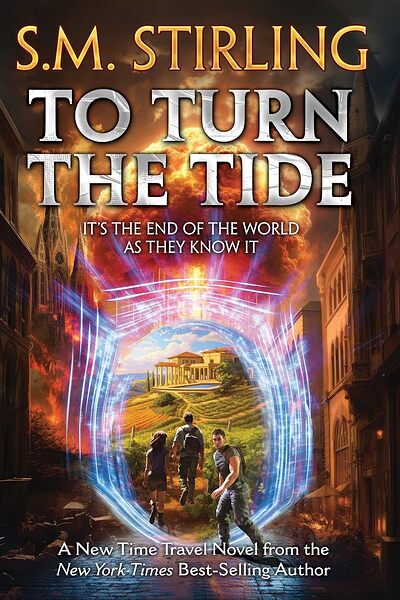Looking for a good read? Here is a recommendation. I have an unusual approach to reviewing books. I review books I feel merit a review. Each review is an opportunity to recommend a book. If I do not think a book is worth reading, I find another book to review. You do not have to agree with everything every author has written (I do not), but the fiction I review is entertaining (and often thought-provoking) and the non-fiction contain ideas worth reading.
Book Review
Stuck in Marcus Aurelius’s Time
Reviewed by Mark Lardas
September 8, 2024
“To Turn the Tide,” by S. M. Stirling, Baen Books, August 2024, 464 pages, $28.00 (Hardcover) , $9.99 (E-book)
You are a mad scientist with a time machine. You learn that a massive thermonuclear war is going to destroy the world in the very near future. What do you do?
In “To Turn the Tide,” a science fiction novel by S. M. Stirling, you pick a time in the distant past to disappear to, like Roman times. You misappropriate research funds to buy everything you need to be comfortable and to play “Connecticut Yankee in King Arthur’s Court” in your new home.
As a physicist you know little about the period. You need translators and subject matter experts. Since you are in Vienna, the best time for you to go back to is Second Century Rome. The Empire is at its apogee, but you will be distressingly close to the Marcomanni War and Galen’s Epidemic.
For subject matter experts you lure five historians, an Ivy League professor and four of his graduate students specializing in that period of Roman history to your laboratory on a fraudulent research project just before things go boom. They are not told what it is about. They would either think you were crazy or want to bring families.
That is how Arthur Vandenberg, West Point graduate, former Army Ranger captain, and newly-minted Harvard professor with four of his Harvard graduate students find themselves in the late Roman Empire in the time of Marcus Aurelius. They witnessed the nuclear bomb blast hitting the scientist’s laboratory just as they were transported back in time.
The scientist? He did not quite reach the time machine in time. He left his legs in modern Vienna with fatal results. The five Americans are on their own. They have no plan and no idea what the scientist planned. They know they cannot go back. They watched their world being destroyed. They have resources, one metric ton of goods with a “change your history’s future kit” and enough silver, gold, synthetic gems to finance them.
They get one break. The first man to encounter them is a rich Jewish merchant who is honest and ethical. Ethical is important because technically it would not be dishonest to kill these non-Romans and simply take their goods.
What follows is a fast-paced adventure in the best tradition of SF novels like “Lest Darkness Fall.” With “To Turn the Tide” Stirling has written a page-turner that alternate history buffs will find hard to put down.
Mark Lardas, an engineer, freelance writer, historian, and model-maker, lives in League City. His website is marklardas.com.
